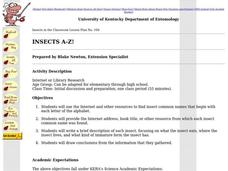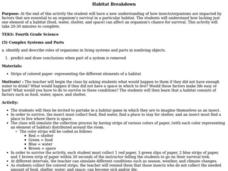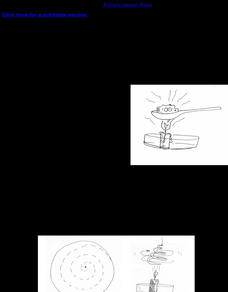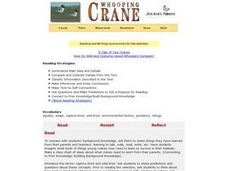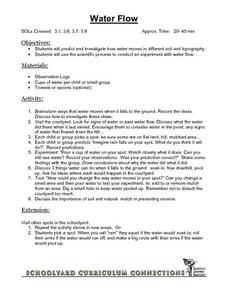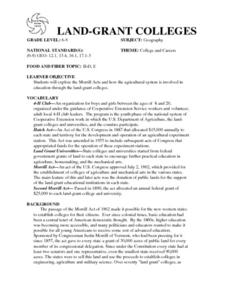Curated OER
Down To Earth
Fifth graders study the physical properties of minerals in order to identify them. They examine how minerals are used before taking part in a activity in which they market toothpaste made from specific minerals.
Curated OER
Insects A-Z!
Students use the Internet and other resources to find insect common names that begin with each letter of the alphabet. They write a brief description of each insect, focusing on what the insect eats and where the insect lives.
Curated OER
CURRENT AND CLIMATE
Students study currents and how they have been used to plot courses for travel. They examine the ocean currents in both the Atlantic and Pacific and discuss their effect on local weather.
Curated OER
Heavy Breathing
Students investigate asthma and air quality, and then map or graph the incidence of asthma by county and air quality information by county in the state of Maryland. They attempt to see any correlations and note any limitations of the data.
Curated OER
Habitat Breakdown
Fourth graders gain an understanding of how insects/organisms are impacted by factors that are essential to an organism's survival in a particular habitat. They see how lacking just one element of a habitat can affect an organisms chance...
Curated OER
Geoscience Careers
Young scholars explore the world of geosciences and all the career possibilities and options that this field of study offers. They relate this field to engineering and other health professions. Each student utilizes technology to assist...
Curated OER
Make It All Better!
Young scholars design an innovation that could help their community. In this technology lesson, students identify problems that could be solved by innovation. They present their ideas in class.
Curated OER
Lesson 3: Understanding Population Growth
Students explain population growth in Maryland and its relationship with age structure, household growth and consumption of land.
Curated OER
Meet the Eastern Flock: Hatch Year 2002
Students read nonfiction books and magazine articles about whooping cranes.
Curated OER
A Tale of Two Cranes How Do Wild and Costume-raised Whoopers Compare?
Students explore what young cranes need to do to survive.
Curated OER
Gray Whales: Hitchhikers: Free Rides on Gray Whales
Learners read about Gray Whales and circle any unfamiliar terms.
Curated OER
COLD SEA WATERS
Students examine how old sea waters affected the local and state area during the summer of 1998. Studying a detailed web-site helps students examine sea temperatures.
Curated OER
Terrestrial Ecozones, Population Density and Species at Risk
Tenth graders navigate and use the online Atlas of Canada. They explain the cause and effect relationship between human settlement and the natural environment and wildlife species. They utilize a worksheet imbedded in this plan.
Curated OER
You want me to do what with this Dirt?
Eighth graders explore how to take soil samples and use GPS to determine the location of the site they have chosen to take the samples.
Curated OER
Graffiti Hurts
Fourth graders examine the economic and social consequences of graffiti. They complete a handout, list their feelings about graffiti, and explore the Graffiti Hurts website.
Curated OER
Site Robbers
Fourth graders interview a Native American and write a newspaper article or letter that expresses concern about robbing archaeological sites.
Curated OER
Canada 2050: Future Population Trends
Students analyze population data and a population pyramid projection for Canada. They make predictions of future society and economic trends.
Curated OER
A Journey of Discovery with RXTE
Students complete different missions to examine the topic of x-ray sources. They use satellite images and websites to gather the information they need to complete the instructional activity. They complete a worksheet to end the...
Curated OER
What Are the Ethical Considerations
Middle schoolers investigate the socioeconomic and environmental issues associated with radon. They examine the laws that exist in New Jersey that pertain to real estate. They work in groups to design new legislation that addresses...
Curated OER
Environment: Water Flow
Students brainstorm the ways that water flows when it falls to the ground. After discussing three things water can do, they investigate and predict water movement outdoors on school grounds. They experiment ways to alter the water flow...
Curated OER
Listening to the Prairie
Learners, in groups, visit an exhibit and for a prairie scavenger hunt to locate sunflowers and name products made from them. After sketching a prairie dog, they find nature cues farmers use when growing plants and raising animals. The...
Curated OER
Land Grant Colleges
Students are introduced to the concept of land grant colleges which allowed agriculture to be brought into education. As a class, they create a timeline and compare and contrast the land grant colleges of 1890 and 1892. They use maps...
Curated OER
People and Parks in the U.S.A.
Fifth graders explore the National Parks in the United States. After locating specified states, 5th graders predict which states have the most National Parks. Given the population of each state, students determine the average acre per...



